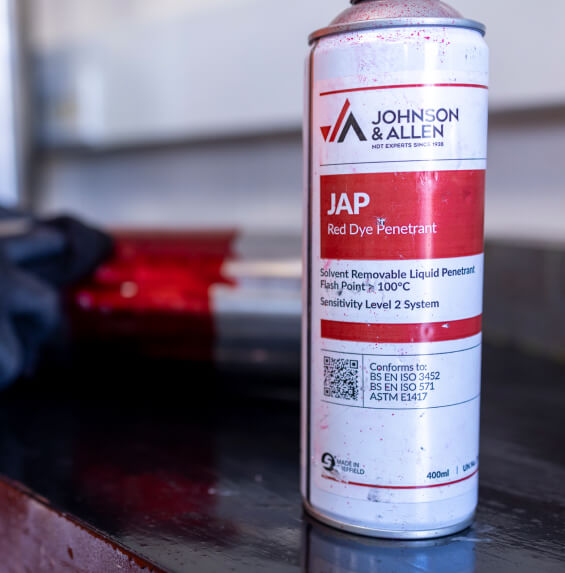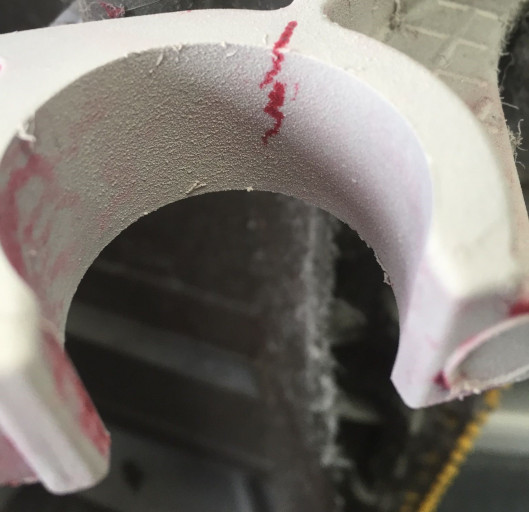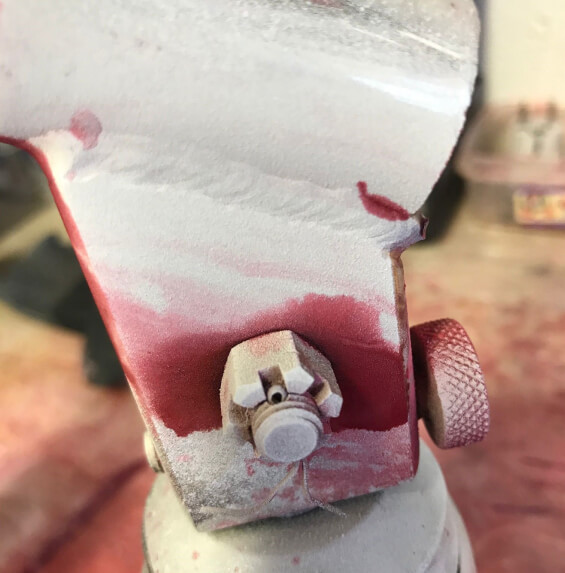“Hayley and STW have been a great asset to our company and have assisted us with their knowledge and professionalism.”
Liquid Penetrant Inspection (LPI) is a highly sensitive NDT method that can be used to detect extremely fine irregularities on the surface of a component. Compatible with ferrous and non-ferrous materials, LPI produces surface indications that can be interpreted by our professional technicians. With more than 10 years’ experience in the industry to draw upon, you can be confident in the accuracy of the results we provide. To arrange Liquid Penetrant Testing, call 01795 432 634 to tell us your requirements. We can be onsite at short notice if needed.
Liquid Penetrant Testing: The method
During Liquid Penetrant Testing a dye or penetrant liquid is applied to the surface of the component. This component must be thoroughly cleaned beforehand to eliminate the potential for contamination. The liquid solution is left on the component for approximately 20 minutes so that capillary action can draw the liquid into any discontinuities within the surface. Any excess solution is removed and a developer is applied to draw out any remaining penetrant, producing a surface indication for the technician to interpret. LPI does not require the material to be ferrous and, therefore, aluminium, stainless steel, and other alloys can be tested. The various methods we use include:
- Colour contrast LPI
- Solvent removable LPI
- Fluorescent LPI
- Water washable LPI
Hear from our clients
“Great service, friendly, helpful and accommodating.”
“ST&W Inspections are a very reliable supplier of ours. They are quick to support us at with any inspections that we require sometimes on a short turnaround. This includes completing paperwork that we require to give to our clients and also if an inspection is required on site, they are always reliable to be able to meet our demands. Also, their knowledge of the industry is massive support to us when we require information when we might not have the answers.“
“It is genuinely a pleasure doing business with you and I look forward to continuing the relationship and using your services“
Discuss your requirements with our team
Liquid Penetrant Testing could be what your project requires; our team will be happy to discuss the options with you. Call us on 01795 432 634, email info@standwinspections.co.uk, or complete our contact form for a same-day response.

When is Non-Destructive Liquid Penetrant Testing needed?
Liquid Penetrant Inspections can be used in a variety of industrial applications, covering many sectors. You could benefit from this inspection method if:
- You require a highly sensitive inspection method that can detect cracks as narrow as 150 nanometres.
- You need to inspect ferrous and non-ferrous materials for surface discontinuities.
- You are unable to paint the surface of your component, as required by Magnetic Particle Inspection.
- You need to assess whether your component complies with the relevant industry standards.
LPI or Magnetic Particle Inspection?
When you need to assess the surface of a component or a weld, there is a choice between LPI or a Magnetic Particle Inspection (MPI). Non-ferrous materials can only be inspected using LPI, as it isn’t possible to generate the magnetic field that is necessary for MPI. The sensitivity of Liquid Penetrant Testing makes it possible to detect even the smallest surface cracks and, depending on the standards that apply to your component, this precision may be required to ensure its compliance. A further consideration is the final appearance of the component. White paint is applied for contrast during a Magnetic Particle Inspection. LPI will allow you to avoid this if the surface of your component needs to remain pristine.

Explore alternate
NDT techniques
If Liquid Penetrant Inspection isn’t the right fit for your requirements, consider one of the other NDT techniques we offer. Our sister company, S.T & W Laboratories can also provide offsite DT such as Hardness and Fracture Testing.

Ultrasonic Inspection
Ultrasonic Inspections gather information about a component’s internal integrity using ultrasonic sound waves.

Visual Inspection
Professional technicians can carry out a Visual Inspection to assess the surface of a component.

District Heating NDT
Our method of NDT provides a safer and lower cost technique for assessing district heating pipelines.

Phased Array Ultrasonic Testing
Phased Array Testing uses an advanced transducer to produce a detailed internal image of a component.

Positive Material Identification
Positive Material Identification can determine whether a material conforms to the correct specification.
Working with
S.T & W Inspections
Working with our team gives you access to more than 10 years of industry expertise. Our technicians can carry out a range of high-quality NDT techniques, allowing you to receive an expert assessment of your component’s integrity. We can respond swiftly to attend your site, ensuring that disruption is kept to a minimum.

Responsible Welding Co-Ordinators
A Responsible Welding Co-Ordinator (RWC) from our team can supervise your welding activities and make sure that all the required procedures are being followed. Having an expert onsite can give you confidence that your welds comply with any relevant industry standards. Plus, if your requirements change, an RWC can be consulted to create new weld procedures for your project.
Contact
S.T & W Inspections
To discuss Liquid Penetrant Testing with our team and tell us your requirements, call 01795 432 634 or email info@standwinspections.co.uk.

